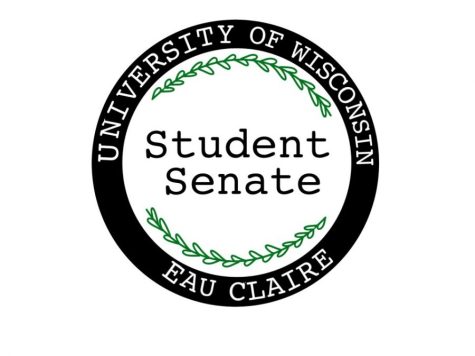Tuition freeze stalls Blugold Commitment
A set of long term university goals is in limbo after a state tuition freeze put the final phase of UW-Eau Claire’s planned differential tuition increase on pause, officials said in a presentation to Student Senate, Monday.
Mike Wick, associate vice chancellor for academic affairs, and budget officer Stephanie Jamelske updated Senate on Blugold Commitment progress after the university found out the final $300 installment of the differential tuition charge would be delayed.
“We have every reason to believe a tuition freeze continues for a second year,” Jamelske said. “After that, it’s absolutely impossible to tell.”
Eau Claire planned to achieve five benchmarks 10 years after the first aspect of the Blugold Commitment went into action in 2010.
The university’s benchmarks are:
— Students participate in multiple high-impact educational experiences before graduation.
— Each Eau Claire freshman will draft and develop a four-year graduation plan.
— The four-year graduation rate will increase from 23 to 40 percent.
— Eau Claire maintain a 19 to one student to faculty ratio.
— Campus academic advisers earn a 90 percent student
approval rate.
Jamelske said the university plans to conserve commitment resources instead of expanding them as planned. But it’s “impossible to predict” how the university’s 10-year goals will be affected by the freeze, she said.
Eau Claire approved a budget for the full $1,200 of commitment funding last year. After learning Blugold funds would be frozen though, university officials had to adjust this year’s budget to fit last year’s $900 per-student charge.
The programs the Blugold Commitment currently funds won’t be in danger, Jamelske said. But the university won’t hire for the three and a half vacant positions it had planned to fill with the last phase of funding.
Extra faculty funding is what keeps the cogs turning toward 10-year goals, she said.
“At any higher education institution it’s very personnel driven,” Jamelske said. “The primary investment is faculty.”
If students can’t get into bottleneck courses because the university can’t afford to pay more teachers, graduation rates suffer.
Mike Wick said there’s evidence extra staff helps keep students on track for graduation.
This year, 256 nursing students enrolled in a chemistry course required for graduation. The university was able to staff enough teachers to fill all class sections using commitment money, Wick said.
Although the university has made progress toward its ten-year goals, there’s more work to be done, he said.
“To sustain a university-wide commitment to getting every student to have one of these high impact practices, we needed to invest in faculty and staff so we have the ability to get that student to faculty ratio down,” Wick said.
Differential tuition isn’t new to Eau Claire. In the early 90’s the university tacked $50 on to tuition to pay for research and other projects. Only four UW system campuses don’t have some form of differential tuition.
What makes differential tuition unique at Eau Claire is student oversight of funds, Student Body President Bryan Larson said during the presentation Monday.
“We need to communicate the difference between our differential tuition and other schools,” Larson said. “Other campuses have very little deference to students.”
Senate passed a resolution earlier this fall backing up its support of the Blugold Commitment and sent copies of the decision to state lawmakers.
The university can continue to push for the freeze to be lifted, but Jamelske said she’s not confident the state decision will be overturned before the end if the two-year budget cycle.
“We certainly hope the value of the Blugold Commitment speaks for itself and the difference it makes seals the deal,” Jamelske said.
In other senate news
Senate unanimously approved next year’s student tech fee budget ranges.
A bigger chunk of the more than $1 million tech fee will go towards supporting “innovative technologies” and last spring’s campus wireless upgrade.






